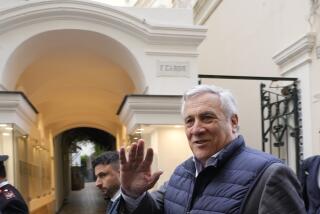G-8 Ministers See Upcoming Iran Talks as Key
- Share via
MOSCOW — The United States, Russia and other key industrialized countries on Thursday increased pressure on Iran over its nuclear program, declaring that Tehran’s intentions would be judged based on its response next week to a proposal intended to put the effort under international control.
Iran’s chief nuclear negotiator, Ali Larijani, is scheduled to meet Wednesday with Javier Solana, the European Union’s foreign policy chief, and senior diplomats from Russia, Britain, France and Germany to discuss the offer.
“We expect to hear a clear and substantive Iranian response to these proposals” at the meeting, foreign ministers from the Group of 8 industrial nations said in a statement issued after their meeting here.
Seeking to keep up pressure on Iran to deliver a serious response rather than one that stalls for additional time, the five permanent members of the U.N. Security Council -- the United States, Russia, China, France and Britain -- and Germany agreed to meet a week later to assess the Iranian position.
Secretary of State Condoleezza Rice and the foreign ministers of the other five nations will meet, most likely in Paris, on July 12. That session would occur just three days before President Bush and other leaders from the Group of 8 hold a summit in Russia, at which Iran’s nuclear program is expected to be the central topic.
Those two meetings could make an initial determination of whether Iran was moving toward cooperation or defiance, even if Tehran tries to avoid giving a formal answer.
Iranian Foreign Minister Manouchehr Mottaki swiftly rejected the demand to respond by July 5, telling reporters at the United Nations that the talks with Solana needed to address questions about the proposal.
“The Islamic Republic of Iran is seriously and carefully reviewing the proposed package,” he said. “I’ve said that such response will be in August.”
Bush had earlier set an informal deadline, calling for Iran to respond within “weeks, not months” to the package of incentives.
Full details of the proposal have not been released, but among the incentives offered is a guarantee that the United States would facilitate a European offer to provide Iran with a light-water reactor and other civilian nuclear technology. Much of the light-water nuclear technology originates in the United States, and without American government approval, the Europeans could not provide it to Iran.
The package is intended to lead Iran back from what Washington believes is a program intended to develop a nuclear weapon. Tehran argues that its program is intended only to develop nuclear energy.
The European Union presented the proposals on behalf of the others June 6.
The U.S. has not taken part in talks with Tehran, because it refuses to have direct contact with Iran until the nation suspends enrichment of uranium, a process that can produce either nuclear fuel or material for nuclear weapons.
In the statement issued at the end of Thursday’s meeting, the foreign ministers from the Group of 8 nations -- the U.S., Britain, Canada, France, Germany, Italy, Japan and host Russia -- said they remained committed to a diplomatic solution but had been “disappointed” by Iran’s failure to respond by now.
Next week’s meeting, they said, should “bring these discussions to a rapid conclusion.”
If an agreement is not reached, Iran faces the possibility of U.N. sanctions intended to restrict its economic development. Russia and China, which wield veto power on the Security Council, have resisted the idea of sanctions.
Asked whether the “disincentives” faced by Iran included sanctions, Russian Foreign Minister Sergei V. Lavrov replied, “We did not discuss anything beyond the offer which we all made in good faith to Iran, which is a positive offer, and we expect a positive, official, specific response to this.”
A senior Bush administration official said Rice had suggested the July 12 follow-up meeting as a way to put pressure on Iran. He spoke on the condition that his name not be disclosed because he was talking about diplomatic discussions.
The official said there was no tension between Rice and Lavrov, who disagree on, among other topics, whether the former Soviet republic of Belarus is moving sufficiently toward democracy. The U.S. is seeking wider adherence to democratic principles there.
“There was no friction whatsoever,” he said.
However, there were suggestions of edgy negotiations during a luncheon meeting on Iraq. The counterparts’ words were picked up in an audio feed that had not been disconnected.
At one point, Lavrov appeared to be explaining drafted language for a statement touching on Iraq. Rice interrupted him, saying, “I’m always a little bit sensitive about this on behalf of the Iraqis. Here we sit in Moscow or in Washington or in Paris telling them to make efforts on national accords when their brothers and sisters are being killed.... I just think it’s gratuitous.”
“Fine,” Lavrov said, adding, “Let’s support what Condi suggested.”
They also appeared to disagree on a statement that condemned the killing of five Russian diplomats in Iraq. The statement said, “This tragic event underlines the importance of improving security for all in Iraq.” It did not specify the need to protect diplomats, which Lavrov had sought.
“Sergei,” Rice was overheard saying, “there is a need for improvement of security in Iraq, period. The problem isn’t diplomatic missions. The problem is journalists and civilian contractors and, yes, diplomats as well.
“The problem is,” Rice continued, “you have a terrorist insurgent population that is wreaking havoc on a hapless Iraqi civilian population that is trying to fight back and on a coalition force that is trying to fight back, and the implication that by somehow declaring that diplomats need to be protected it will get better, I think is simply not right.”
More to Read
Sign up for Essential California
The most important California stories and recommendations in your inbox every morning.
You may occasionally receive promotional content from the Los Angeles Times.










